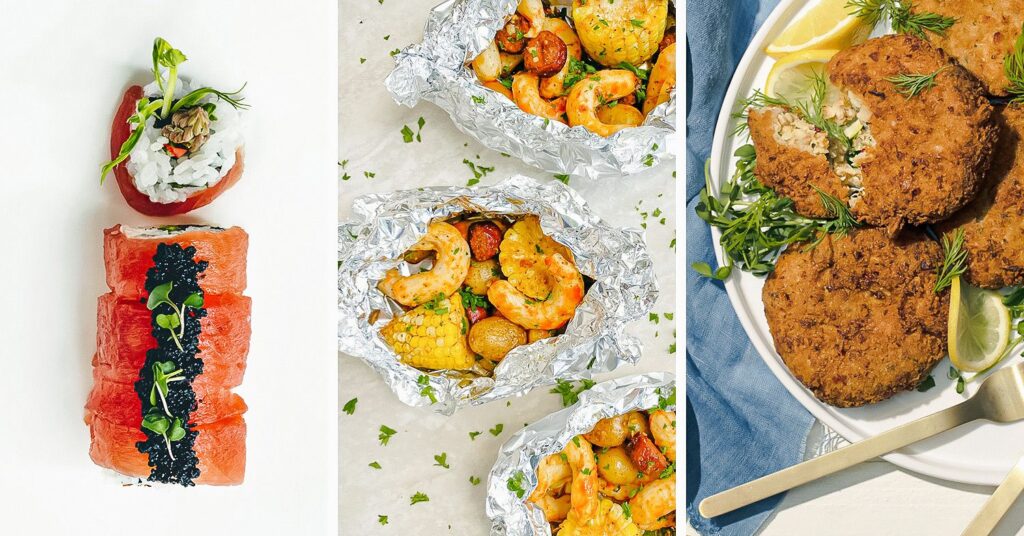(Updated May 28, 2021) | From caviar to crab cakes, plant-based seafood is easier to find online and in supermarkets than ever before. The vegan seafood market is also taking off as brands work to meet the growing demand for plant-based products. But with so much to choose from, what are the best vegan seafood options out there? And first of all, what, exactly, is vegan seafood made from?
What Is Vegan Seafood?
The plant-based food sector is booming. According to the Good Food Institute (GFI)—an organization that promotes cultivated and plant-based products—the vegan meat market, which includes seafood alternatives, is worth $1.4 billion.
And while the vegan seafood industry is still relatively new, brands are still churning out fishless products in order to keep up with the growing demand for plant-based foods.
From algae and pea protein to fungi and vegetables, vegan seafood can be made from a number of ingredients. And, it comes in several forms, including shrimp, fishsticks, tuna, and more.
The Plant-Based Seafood Co. makes lobster crab cakes from artichoke and hearts of palm. Vegan Zeaster churns out plant-based Zalmon Shashimi made entirely from vegetables, including seaweed. And Fry’s Family Food carries soy-based crispy golden fish-style filets that contain more Omega-3 than tuna.
Plant-Based Seafood Market
Innovation in the vegan seafood market is already well underway. Investments in the sector have been steadily increasing since 2017, which saw $4 million invested in the category. In 2018, this increased to $16.7 million, 2019 saw $41 million in investments, while 2020 had more than $35 million invested in the vegan seafood market, according to GFI.
In April, Gathered Foods—the parent company of plant-based tuna brand Good Catch—secured $26.35 million in funding. Last year, the company landed $36.8 million in funding, which included investments by celebrities like Woody Harrelson and Paris Hilton.
The same month, food tech startup Revo Foods also announced it had garnered €1.5 million to produce its 3D-printed, plant-based seafood.
A new report reveals the global plant-based seafood sector is set to increase over the next ten years at a compound annual growth rate of 28 percent. Market research firm Fact.MR finds the industry will be worth $1.3 billion by 2031.
But why opt for vegan seafood in the first place? Well, eating fish comes with a catch.
Environmental Impacts of Conventional Seafood
Despite criticism, the Netflix documentary Seaspiracy still achieved its mission of exposing the environmental impacts of the fishing industry. The film—produced by Kip Andersen as a follow-up to his award-winning 2014 documentary on factory farming, Cowspiracy, set tongues wagging after directors Ali and Lucy Tabrizi uncovered an “alarming global conspiracy” linking the ways in which human activity contributes to oceanic destruction.
From fishing gear polluting the ocean to illegal hunting practices, the film explores the dark underside of the fishing industry. “The rate of destruction in our oceans is outpacing our knowledge of its wonders,” Lucy shared on Instagram.
She added: “It’s crucial that we engage in this urgent conversation to protect the most incredible habitat on earth before it’s too late… And this film will spark that.”
Overfishing has resulted in the decline of at least two-thirds of all large fish. And since 1950, one in three fish populations have collapsed as a result.
Bycatch—fish or other marine species that are unintentionally caught by fishermen—is also prevalent in the fishing industry. Some of the bycatch, including turtles and sharks, are endangered species. And Greenpeace reports that as many as 100 million sharks and 300,000 dolphins, whales, and porpoises are killed by the commercial fishing industry each year.
Conventional Seafood and Climate Change
In addition to ocean pollution and the issue of bycatch, conventional seafood is also a major driver of global warming.
Fuel consumption, methods used to catch fish (including wild-capture fishing and aquaculture), and seafood processing carry a hefty carbon footprint. A 2018 study found crustacean farming had a higher carbon footprint than the production of both cheese and pork.
According to the Yale Center for Environmental Communication, other types of aquaculture—such as tilapia and catfish farming—cause the same amount of greenhouse gas emissions as the production of beef.
“By making people a lot more aware about the impacts of their consumption, you are also creating a demand for new types of products,” Xavier Irz, food markets scientist at the Natural Resources Institute, Finland, told Yale.
“And I think that this will lead to innovation. And this, in my opinion, is going to lead to reactions throughout the supply chain,” Irz continued.
7 of the Best Vegan Seafood Products to Try
Looking to satisfy all of your fish cravings while on a plant-based diet? Take the sustainable bite out of seafood with these plant-based products.
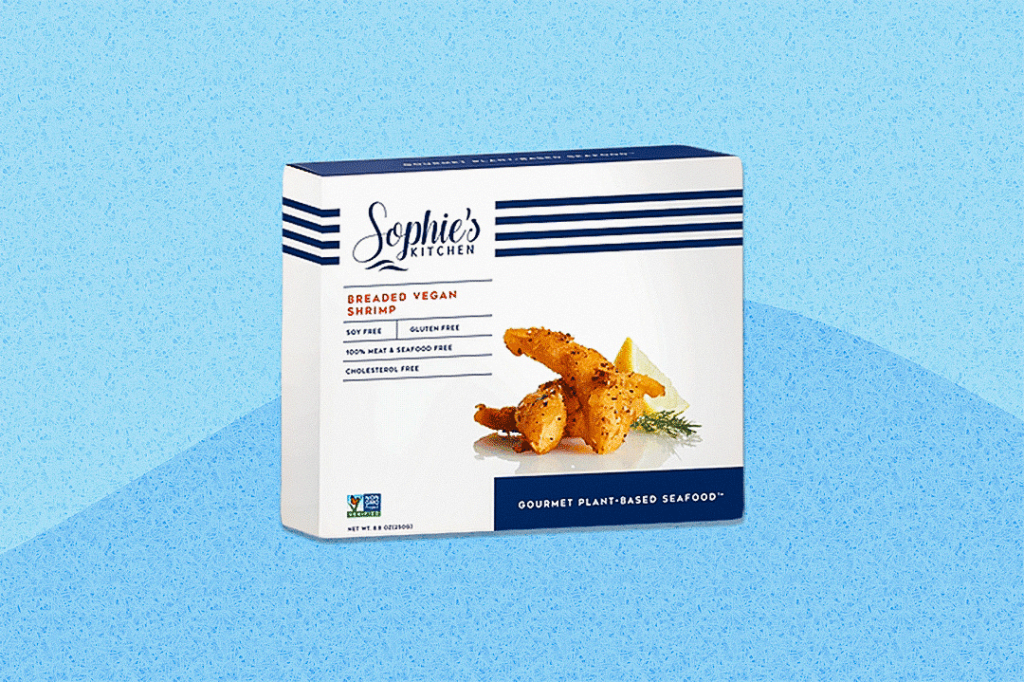
Sophie’s Kitchen Breaded Vegan Shrimp
This plant-based brand is no stranger to churning out vegan seafood that’s “tasty AF (as fish).” Sophie’s Kitchen carries a number of vegan fishless products, including crab cakes, filets, smoked salmon, and tuna. The company developed its vegan breaded shrimp to mimic the texture of its seafood counterpart. It features a number of plant-based ingredients, including konjac powder, beta glucan—a form of soluble dietary fiber—and potato starch. The vegan shrimp can be found online or in retailers like Walmart and Sprouts Farmers Market.
Hungry Planet Crab Cakes
This award-winning range of chef-crafted plant-based meats includes vegan ground pork, beef, and chicken. The company also carries vegan ground crab and crab cakes. Soy protein concentrate and textured wheat protein give the latter its “crablike” texture. Although the former is currently only available to foodservice outlets, you can shop the lightly breaded and seasoned crab cakes online.
Get it here.
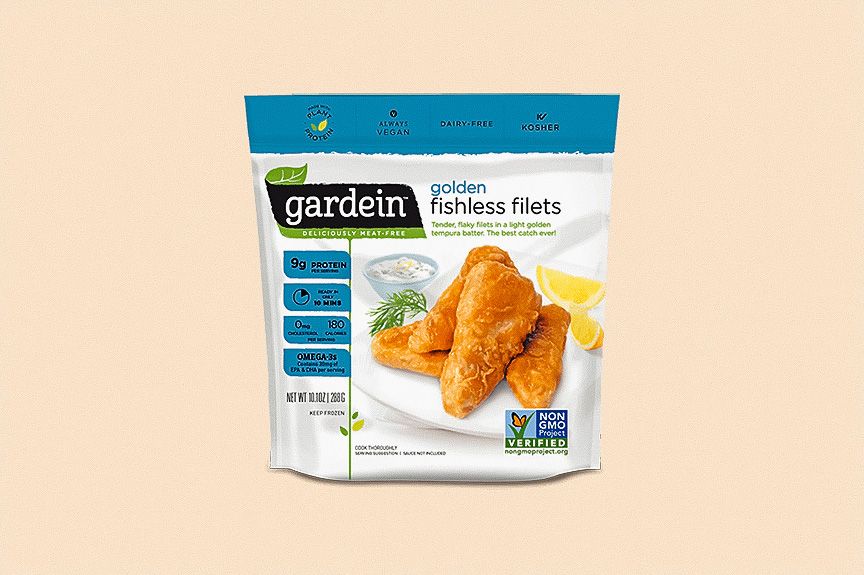
Gardein Golden Fishless Filet
A favorite among many, Gardein carries a wide range of vegan meats, including crispy tenders, meatless meatballs, turkey cutlets, and even chicken wings. For a sustainable catch, try the brand’s crabless cakes or fishless filets. The soy-based fish filets can be found in a number of stores, including Target. Serve the soy-based fishless filets, which feature nine grams of protein, with a side of vegan tartar sauce.
Get it here.
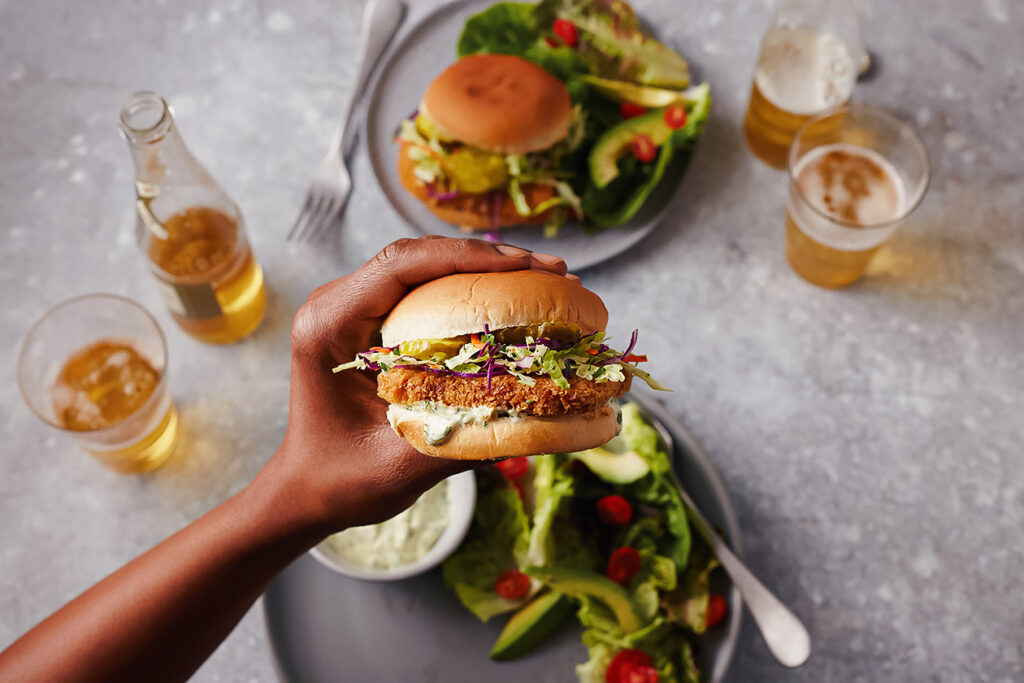
Good Catch Fish-Free Tuna and Breaded Fish
Vegan fish company Good Catch has been disrupting the fish industry since it was founded by chefs Chad and Derek Sarno in 2016. The company carries everything from plant-based fish cakes to fish burgers and crab cakes. But it’s probably most known for its vegan tuna, available in a number of different flavors—including oil and herbs and Mediterranean. The vegan tuna is made from a blend of six plant proteins: pea protein isolate, soy protein concentrate, chickpea flour, lentil protein, faba protein, and navy bean flour. In May, the company launched a new line of breaded vegan seafood products, including frozen fish sticks, crab cakes, and fish fillets.
Get it here.
Caviart Seaweed Caviar
Yes, nowadays, you can even purchase sustainable, vegan caviar. The kelp caviar brand offers a number of different varieties of seaweed caviar. These include black, pink, and wasabi seaweed. Shop the seaweed-base caviar online.
Get it here.
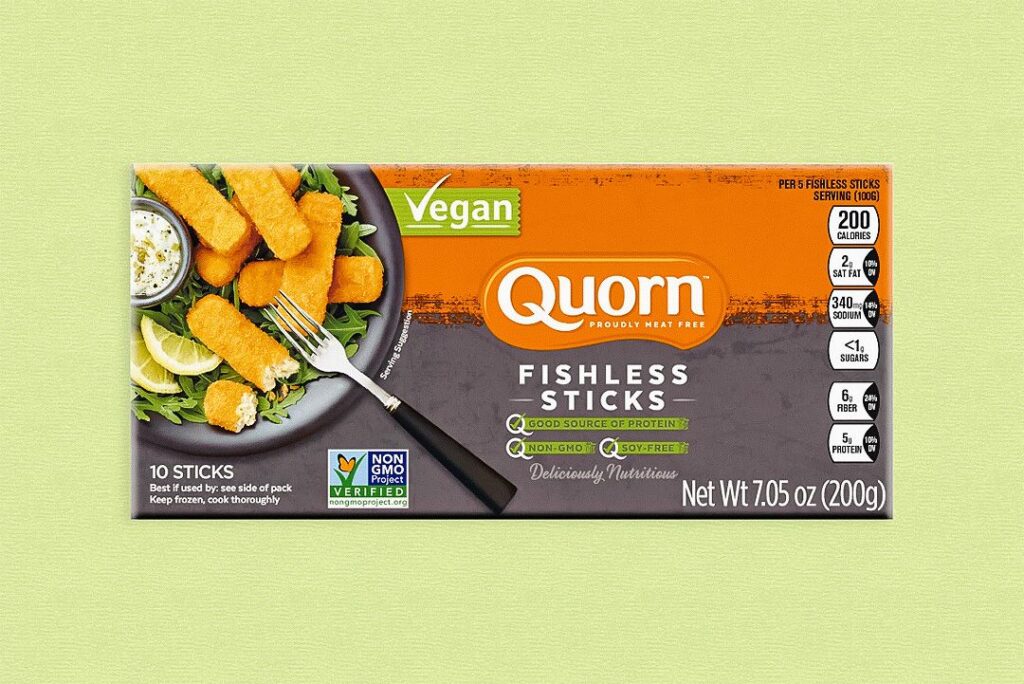
Quorn Fishless Sticks
Although not a vegan brand, Quorn does offer plant-based options, such as its spicy vegan burgers and nuggets. You can also cook up some of the company’s non-GMO and soy-free fishless sticks. The rice- and wheat-flour based fishsticks, available in most major retailers, are a good source of protein, containing five grams per serving.
Get it here.
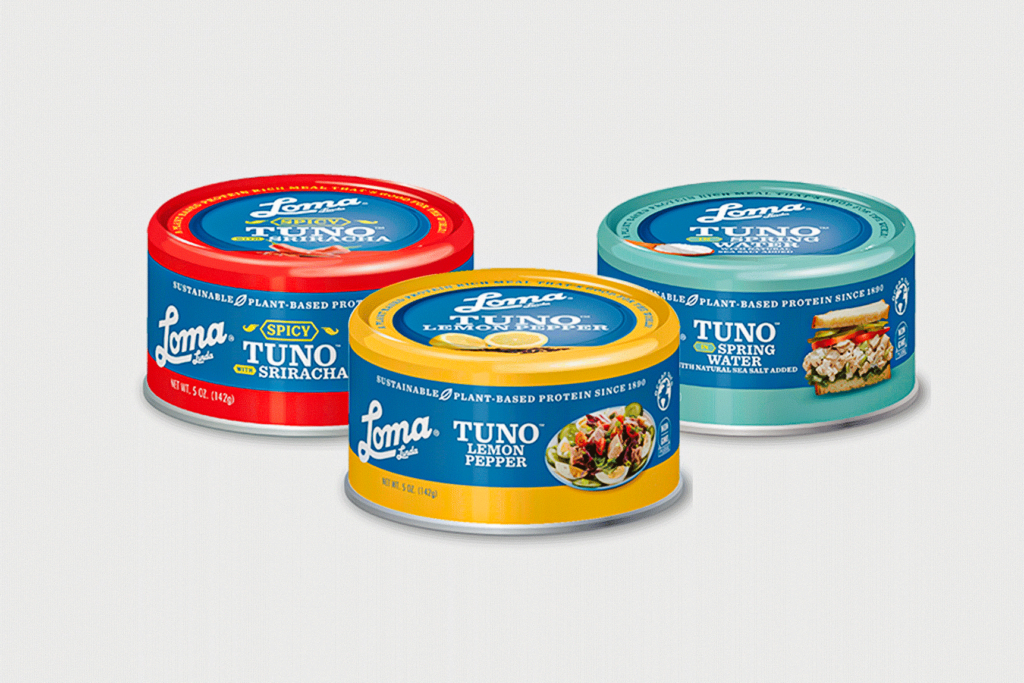
Loma Linda Tuno
In 2019, vegan meat brand Loma Linda launched its line of plant-based tuna at Walmart. The tinned vegan tuna is available in three flavors: spring water, lemon pepper, and sriracha. The fishless tuna is cholesterol and trans-fat free and contains 8-20 percent less sodium than conventional tuna products. The brand’s soy-based tuna is also sold in packets in flavors Thai sweet chili, lemon pepper, and sesame ginger.
Get it here.
LIVEKINDLY is here to help you navigate the growing marketplace of sustainable products that promote a kinder planet. All of our selections are curated by the editorial team. If you buy something we link to on our site, LIVEKINDLY may earn a commission.


